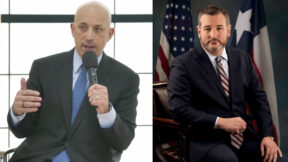WATCH: Professor Explains ‘Motivational Interviewing’ Strategies to MSNBC’s Joshua Johnson That Help Convince People to Get Vaccinated
If you’ve watched more than a minute of television news over the past year, you’ve been inundated with statistics about the Covid-19 vaccines: which ones have been approved, how many doses have been manufactured, how many Americans have received at least one dose, how many are fully vaccinated, and so on. Lately, the focus has been shifting to how to best convince the unvaccinated to get the shot, and a professor of public health appeared on MSNBC to share some helpful strategies for convincing the vaccine hesitant to roll up their sleeves.
Joshua Johnson, host of The Week, spoke with University of Michigan Prof. Ken Resniscow about “motivational interviewing.” In his introduction of Resnicow, Johnson said that “scolding people with facts and figures and data” was not working to change people’s minds about the safety and effectiveness of the vaccines, but this approach had a better track record.
Resnicow defined motivational interviewing as a “patient-centered” style of communication used by health care providers that “uses a lot of reflective listening, supports autonomy, and generally doesn’t use a lot of unsolicited advice.”
Johnson asked the professor what was the problem with unsolicited advice, having noted earlier that many vaccinated people had found it “understandably frustrating” to see people ignoring the “overwhelmingly positive data” about the vaccines.
Advice that people have already heard and rejected, replied Resnicow, ends up functioning as “more of a nuisance factor,” and it was important to “first establish some rapport with the person” and “let them express their concerns” before trying to offer advice.
“Until you have allowed them to discharge their resistance energy,” said Resnicow, “advising them and informing them is premature. We first have to neutralize that resistance.”
Johnson remarked that this sounded “kind of similar” to tactics he used as an interviewer “where someone is busting with something they want to say and they’re hot to say it.”
“If I just let them speak and let them say what’s on their mind, that buys me permission to ask whatever I want because they know that I’ve heard them and then we just talk like civilized people.”
Resnicow agreed that was an effective strategy. Another, he continued, was to use “reflective statements.”
“Ask someone, ‘What is worrying you most about the vaccine?’ or ‘What if anything can I do to help move you forward?’ Let them express their anger, their doubts, and reflect it back.”
That approach, Resnicow explained, sends the message, “I’m trying to understand you, I’m not going to judge, you, I’m not going to push you.”
Johnson and Resnicow discussed the frustration many people were experiencing, and while the professor agreed that was “understandable,” he pointed to what had proved to be effective.
According to Resnicow, “hundreds of randomized trials” had shown that attempting to persuade with “guilt and shame or pressure” was simply not effective, and it was far better to “affirm” that someone was trying to make a good decision and to “establish a bridge” between you and them before trying to persuade or even inform.
“Professor, I want to be clear with what you’re saying,” said Johnson. “You’re talking about reflecting understanding, not agreement,” commenting that another guest had referred to this as “tactical empathy.”
“You’re not saying you agree with them, you’re reflecting back to say you heard them as they intended to be heard. Is that it?” asked Johnson.
“Precisely,” replied Resnicow. “By using ‘you’ statements rather than ‘I agree’ statements, it shows I hear you, I’m not endorsing your belief, but I understand what you’re telling me.”
Watch the video above, via MSNBC.





Comments
↓ Scroll down for comments ↓